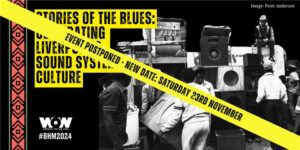“Please try to remember that what they believe, as well as what they do and cause you to endure does not testify to your inferiority but to their inhumanity.”
— James Baldwin, The Fire Next Time
October 2024’s Black History Month arrives on the back of some of the most shocking race riots the UK has seen in many, many years. The weaponisation of the brutal and tragic attack on young girls and their tutors in Southport, which ignited riots across the UK and racist and Islamophobic attacks on people, communities and institutions, including Mosques, testifies, in the centenary of his birth, to the words of James Baldwin about the lack of humanity of the fascist and far right groups.
Writing on the Wall’s Black History Month Programme for October 2024 has been created to respond to those events and highlight the work we and our partners and communities have been delivering since our inception in 2000.
‘Reclaiming Narratives,’ the national theme for Black History Month, highlights the ongoing need to offer a platform for black and ethnic minority writers, artists and communities to celebrate their integral contribution to British cultural, social and political life, and offer a contrast to the bigoted insular world view of the far right groups and populist politicians – who sow doubt and spread falsehoods, adding to the racist contagion which resulted in Liverpool’s Spellow Lane Library being torched.
Our Creative Heritage work rescues lost, forgotten, or neglected archives, giving voice to stories marginalised by mainstream history. In the Great War to Race Riots Archives, black workers describe their destitution, colour bars, and racial violence in 1919, not through the lens of researchers, but in their own words. The George Garret Archive features a working-class activist’s scathing critique of the Seafarers Union’s racist leadership. Dorothy Kuya’s archive offers a window into 20th-century race relations, echoing the L8 Archives’ testimony to the struggles of black communities worldwide, to shape their own narratives against racism.
Despite black and diverse histories still not being taught in schools and in the face of the phony culture wars and the establishment’s continued insistence on whitewashing our history, we know that Black History Month, and initiatives such as our Creative Heritage Programme have a deep and significant impact. The recent British social attitudes survey conducted by the National Centre for Social Research shows that the UK has become less nationalistic and jingoistic and, most sharply, less proud of the history of the British Empire and its colonial legacy.
This may not chime with the scenes of violent racism unleashed on the streets of Liverpool this August, but we must remind ourselves that those racists who vented their anger on a community library, and in cowardly attacks on individuals, remain a minority in British society.
During Black History Month we look to historical lessons of how the far right have been marginalised and ultimately defeated, through education, music and culture, community and trade union activism and, as we saw in the magnificent anti-racist demonstrations in cities and towns across the UK, by confronting them and reclaiming the streets.
Most importantly during this Black History Month we send a message of solidarity from Writing on the Wall to all communities affected by recent events, and we declare ‘Whose streets? Our streets!’
More incredible events to be announced!





